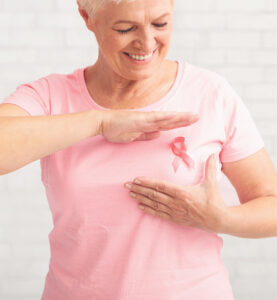 Breast cancer is a significant health concern, particularly for older women. As the second most common cancer among women, it’s essential to understand the facts and dispel the myths that surround it. Read on to learn about common breast cancer myths so you know the facts.
Breast cancer is a significant health concern, particularly for older women. As the second most common cancer among women, it’s essential to understand the facts and dispel the myths that surround it. Read on to learn about common breast cancer myths so you know the facts.
Myth: If I Don’t Have a Family History of Breast Cancer, I’m Safe
One of the most prevalent myths is that only women with a family history of breast cancer are at risk. While having a family history of breast cancer does increase the risk, most women diagnosed with breast cancer do not have a family history of the disease. According to the American Cancer Society, only about five to ten percent of breast cancer cases are linked to inherited genetic mutations. The truth is that every woman, especially as she ages, should be vigilant about breast cancer screening, regardless of family history.
Myth: Breast Cancer Only Affects Older Women
While age is a significant risk factor, breast cancer can occur at any age. However, the risk of breast cancer does increase with age. Women aged 40 and above should be particularly attentive to breast cancer screening recommendations. As women age, especially after 50, the frequency and necessity of screenings may increase due to the heightened risk.
Myth: Small Breasts Lower the Risk of Breast Cancer
The size of a woman’s breasts does not determine her risk of developing breast cancer. This myth likely arises from the misconception that smaller breasts have less tissue to develop cancer. In reality, breast cancer occurs in the cells of the breast tissue, and all women, regardless of breast size, have breast tissue. Thus, the risk of breast cancer is present in all women.
Myth: Only Women Get Breast Cancer
While it’s true that breast cancer is far more common in women, men can develop breast cancer too. Men have breast tissue, and although their risk is much lower, they are not immune.
Myth: A Lump is the Only Sign of Breast Cancer
A lump in the breast is one of the most common signs of breast cancer, but it’s not the only one. Other symptoms can include changes in breast size or shape, dimpling of the skin, nipple discharge that isn’t breast milk, and redness or scaling of the nipple or breast skin. Additionally, some women diagnosed with breast cancer may not have any noticeable symptoms, which is why regular breast cancer screening is so vital, especially as you age.
Myth: Mammograms Cause Cancer
Some fear that the radiation exposure from mammograms can increase the risk of breast cancer. However, the level of radiation used in a mammogram is extremely low. The American Cancer Society emphasizes that the small amount of radiation exposure from a mammogram does not significantly increase breast cancer risk.
Myth: If You’ve Been Diagnosed With Breast Cancer, It’s a Death Sentence
Thanks to advances in medical technology, treatment options, and early detection, being diagnosed with breast cancer is not an automatic death sentence. Many women live long, healthy lives after breast cancer treatment. The survival rates for breast cancer have improved significantly over the years, especially when the cancer is caught early.
Myth: Antiperspirants and Bras Can Increase Breast Cancer Risk
There’s no scientific evidence that antiperspirants or bras cause breast cancer. These myths have circulated widely, but extensive research has found no link between wearing a bra, especially underwire bras, or using antiperspirants and an increased risk of breast cancer.
Myth: Healthy Lifestyle Completely Eliminates the Risk of Breast Cancer
While maintaining a healthy lifestyle can reduce your risk of breast cancer, it does not entirely eliminate it. Regular exercise, a balanced diet, and limiting alcohol intake can indeed lower the risk, but they cannot guarantee immunity.
Myth: Breast Cancer Always Requires a Mastectomy
A mastectomy, or the removal of the entire breast, is not the only treatment option for breast cancer. Depending on the stage and type of cancer, many women may be eligible for a lumpectomy, which removes only the tumor and some surrounding tissue. This option is often followed by radiation therapy. The treatment plan for breast cancer is highly individualized and should be discussed thoroughly with a healthcare provider.
Understanding the facts about breast cancer is crucial, especially for seniors who are at an increased risk due to age. Dispelling common myths can help you make informed decisions about your health. Schedule an appointment with your local VIPcare provider to discuss your breast cancer risk and the proactive steps you should be taking. Call 239-747-7202.
VIP Care
239-747-7202
www.getvipcare.com
20291 Summerlin Rd, Ste 105
Fort Myers, FL 33908
941-541-4812
www.getvipcare.com
405 S Indiana Ave., Ste 465
Englewood, FL 34223
941-271-7897
www.getvipcare.com
8620 S Tamiami Trl, Ste F&G
Sarasota, FL 34238







